by Lisa Cooke | Oct 21, 2015 | 01 What's New, Canadian, Immigration, Records & databases
Library and Archives Canada, the Canadian national archive, holds original passenger arrival records. You can search a massive index to them on their website for free.
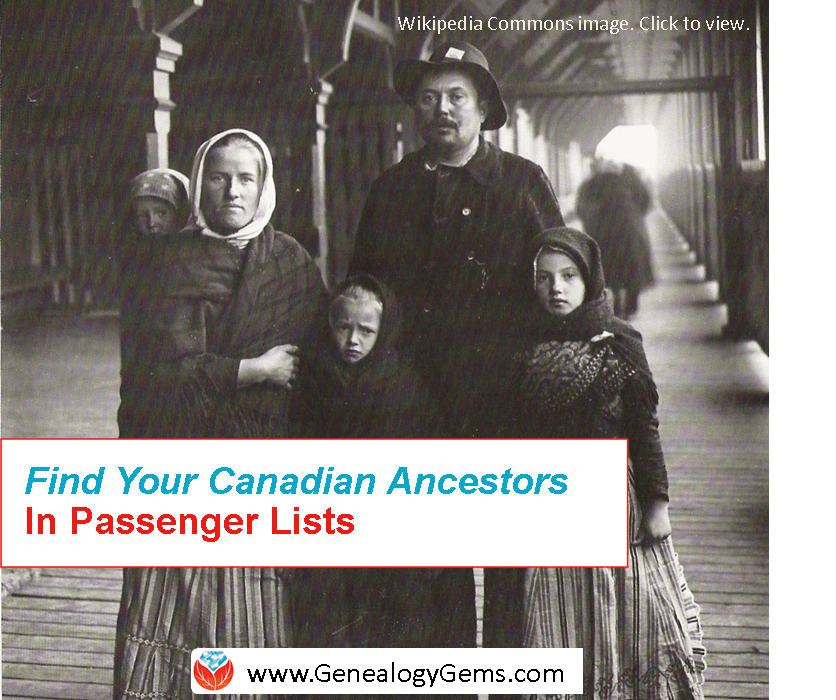
Canadian Passenger Arrival Lists: The Good and Bad News
There’s good news and bad news for those searching for Canadian passenger arrival lists.
The Bad News:
You won’t find a lot of Canadian passenger arrival lists before 1865. There are no comprehensive nominal lists of immigrants arriving prior to 1865 in Canada according to the Library and Archives Canada. Unfortunately, those lists didn’t generally survive.
Those that have can be scattered amongst various French and British collections.
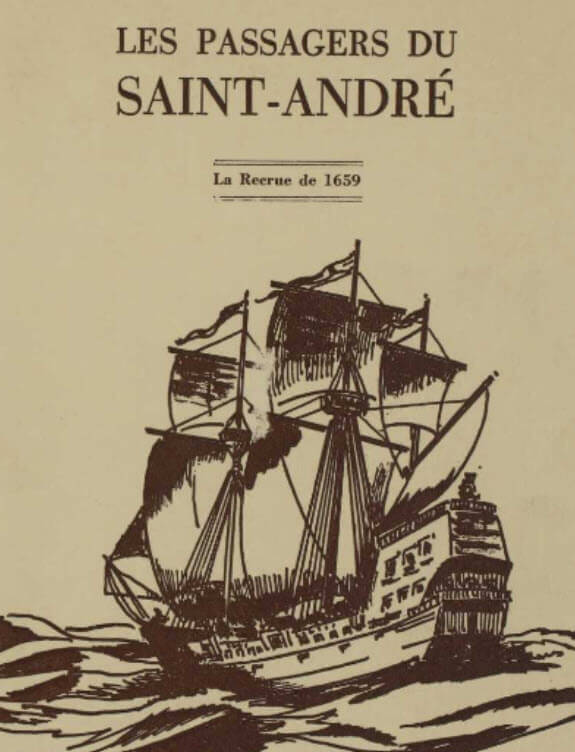
“Les passagers du Saint-André : la recrue de 1659” is among the French resources at the Library and Archives Canada.
Visit the Passenger Lists page at the Library and Archives Canada here for details lists, years and microfilm numbers.
Good news:
You will be able to find a lot of records after 1865.
And the news gets even better. These records can easily be found online!
“The passenger lists are the sole surviving official records of the arrival of the majority of people accepted as immigrants in Canada,” says a Library Archives Canada webpage. “The passenger list is a list of immigrants arriving at an official port of entry on a particular ship on a given date.
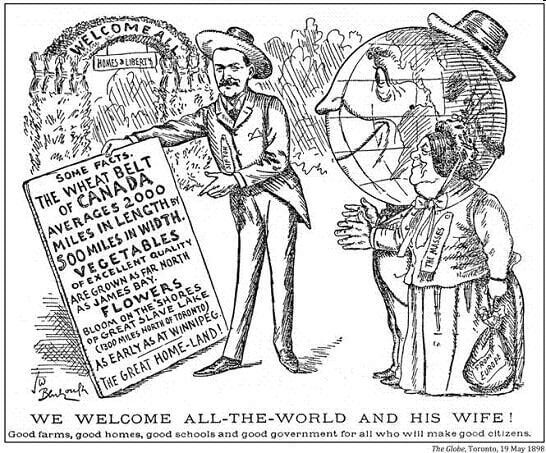
Newspaper advertising was used to attract immigrants to Canada
Information Found in Canadian Passenger Lists
Generally speaking, each manifest provides the following information:
- the name of the ship
- port(s)
- date(s) of departure and arrival in Canada
- names
- ages
- sex
- professions or occupations
- nationalities
- destinations
The earlier lists aren’t always so detailed. But in some cases, other lists have information about the travelers’:
- health
- religion
- previous travels to Canada
- family members
- and how much they carried in their wallets.
Where to Search for Canadian Passenger Lists 1865-1922
Start your search for free in the Passenger Lists, 1865-1922 collection at the Library and Archives Canada website.
The city of Quebec, the major arrival port for many years, is covered for nearly that entire time span.

Quebec: Major Arrival Port in Canada
If you find it easier to search for these records in genealogy websites (so you can attach them to individuals in your tree), or if you’re specifically looking for passengers whose final destination was the U.S., check out these databases:
Canadian Passenger lists, 1881-1922 at FamilySearch.
The database includes records for Canadian ports:
- Quebec City,
- Halifax,
- St. John,
- North Sydney,
- Vancouver
- Victoria
- U.S. ports for passengers who reported Canada as their final destination.
Canadian Passenger Lists, 1865-1935 at Ancestry.
Quebec ports are included for these time periods:
- May 1865–Jun 1908,
- Jun 1919–Jul 1921,
- Apr 1925–Nov 1935.
U.S., Passenger and Crew Lists for U.S.-Bound Vessels Arriving in Canada, 1912-1939 and 1953-1962 at Ancestry.
Nearly 100,000 records of travelers to the U.S. via Canada are recorded for the ports of:
- Montreal
- Quebec
- Saint John
- New Brunswick
- Halifax
- Nova Scotia
- Vancouver
- British Columbia
- Victoria
- British Columbia
- Toronto
- Ontario
- Quebec
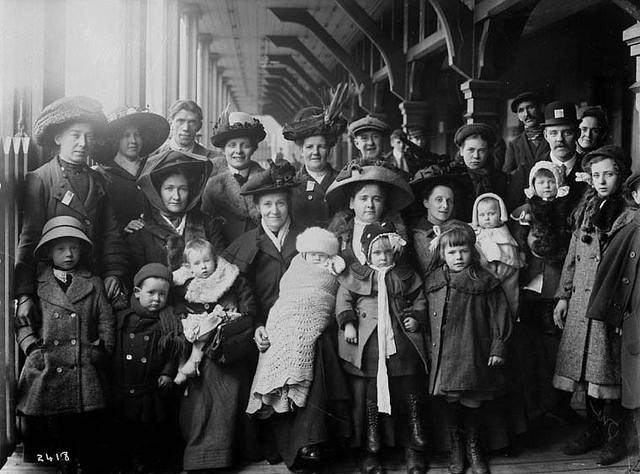
Mixed group immigrants, Quebec
More Great Canada Genealogy Resources
We have several more resources to assist you in your Canadian family history research.
- Click here to learn why Quebec Church Records are a Great Place to Look for Ancestors.
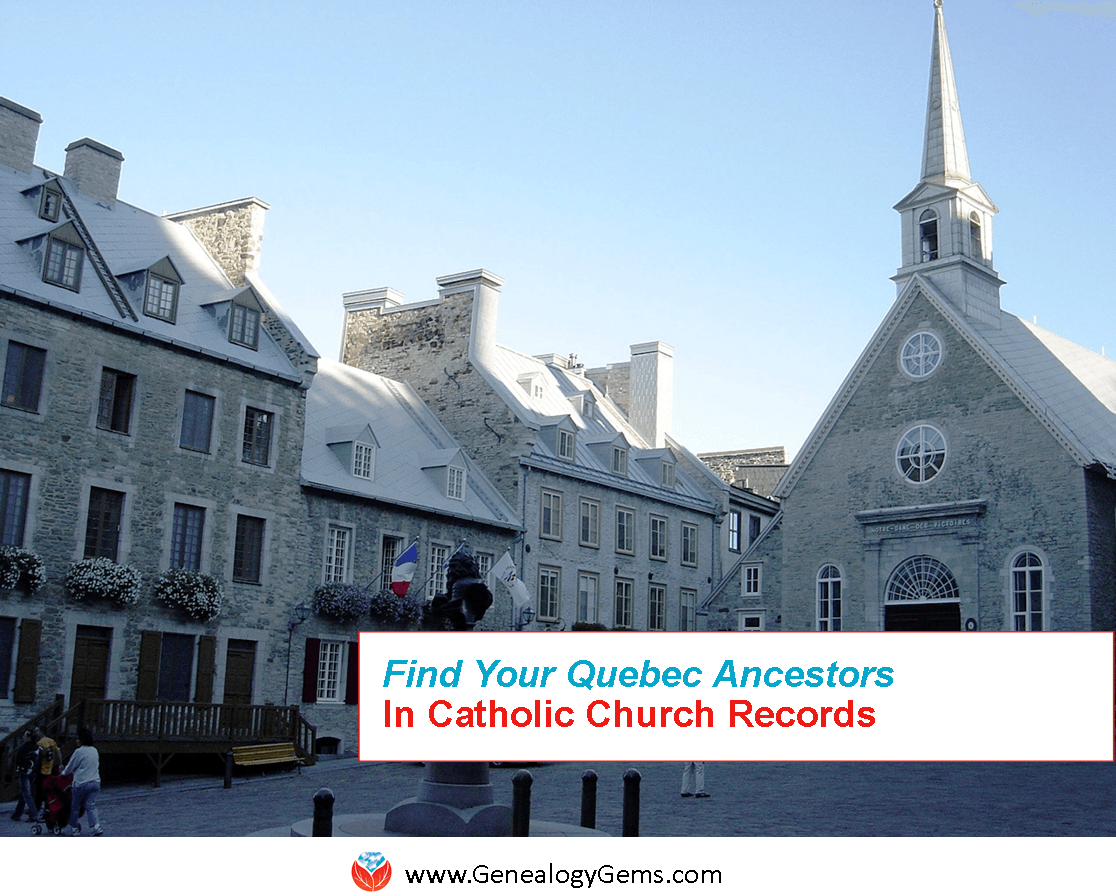
Notre-Dame-des-Victoires Church, Basse-Ville (Lower Town). Wikimedia Commons image; click to view.
by Lisa Cooke | Mar 3, 2015 | 01 What's New, Digital Archives, Memory Lane, Newspaper, United States
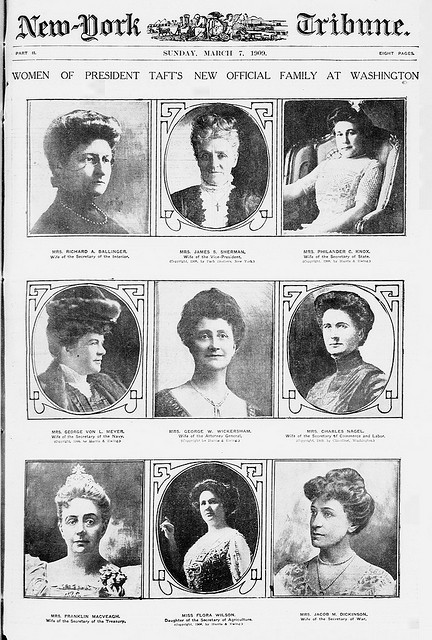
Women of President Taft’s New Official Family at Washington, New York Tribune, March 7, 1909. Cover, illustrated supplement. Library of Congress image, posted at Flickr. Click to visit webpage.
The Library of Congress has a Flickr album that’s front page news–literally! It’s a New York Tribune archive with newspaper covers dating back more than a century.
“This set of cover pages from the New York Tribune illustrated supplements begins with the year 1909,” explains the album. “The pages are derived from the Chronicling America newspaper resource at the Library of Congress. To read the small text letters, just click the persistent URL to reach a zoomable version of the page.”
“Daily newspapers began to feature pictorial sections in the late 1800s when they competed for readers by offering more investigative exposés, illustrations, and cartoons. In the 1890s, William Randolph Hearst and Joseph Pulitzer tapped into new photoengraving techniques to publish halftone photographs, and other newspapers soon adopted the practice. The heavily illustrated supplement sections became the most widely read sections of the papers and provided a great opportunity to attract new customers. The daily life, art, entertainment, politics, and world events displayed in their pages captured the imagination of a curious public.”

Available at http://genealogygems.com
We don’t often find our ancestors splashed across front-page news. But we can read over their shoulders, as it were, to see what was going on in their world and what others around them thought about these events. Newspaper articles and ads reveal fashions and fads, prices on everyday items, attitudes about social issues and more. Read all about using old newspapers for family history in How to Find Your Family History in Newspapers by Lisa Louise Cooke.
by Lacey Cooke | Mar 16, 2019 | 01 What's New, Records & databases
This Saint Patrick’s Day we’re highlighting new and updated genealogical collections for Ireland and Scotland! You’ll see new and updated records from Ancestry and Findmypast, with particular emphasis on newspaper additions including birth, marriage,...
by Lisa Cooke | Sep 17, 2013 | 01 What's New, Family History Library, FamilySearch
 The biggest family history library in the world just got a new boss! Diane Loosle is the new Director of the flagship Family History Library (FHL) in Salt Lake City, Utah, and the first woman to hold this job. She has exciting ambitions for the FHL and I look forward to seeing how they unfold.
The biggest family history library in the world just got a new boss! Diane Loosle is the new Director of the flagship Family History Library (FHL) in Salt Lake City, Utah, and the first woman to hold this job. She has exciting ambitions for the FHL and I look forward to seeing how they unfold.
Diane mentions three specific goals she’ll focus on between now and the end of 2014:
- “Become more family and youth-oriented through providing interactive, discovery experiences.
- Enhance the services of the library through new collaborative research areas and better access to research staff.
- Engage more patrons from the geographic community surrounding the library.”
As an example of the first objective, a FamilySearch press release says Loosle wants to “study the role of the Family History Library and 4,700 satellite branches worldwide…and how to make them discovery centers for people of all ages, not just a research facility.”
“Our centers are great places to do genealogical research,” Loosle says. “[But] we need to figure out how to balance the needs of researchers while increasing appeal to those with other family history interests. You can’t attract a younger audience and offer the same experiences. We need to offer fun experiences and activities for the entire family that will increase love, appreciation, and understanding of their ancestors.”
I admit I’ve wondered about the future of satellite family history centers as increasingly folks stay home to research online. So I look forward to seeing how she will reinvent these community resources to serve today’s (and tomorrow’s) genealogical researchers.
Loosle comes to this job with great credentials. She is an accredited genealogist who has been with FamilySearch for 19 years, where she championed new customer service initiatives. She also has an MBA, strong business and leadership skills. She is described by a senior executive at FamilySearch as “one of the most qualified and capable to ever serve in this position.”
Congratulations, Diane! We look forward to seeing what’s coming next.









